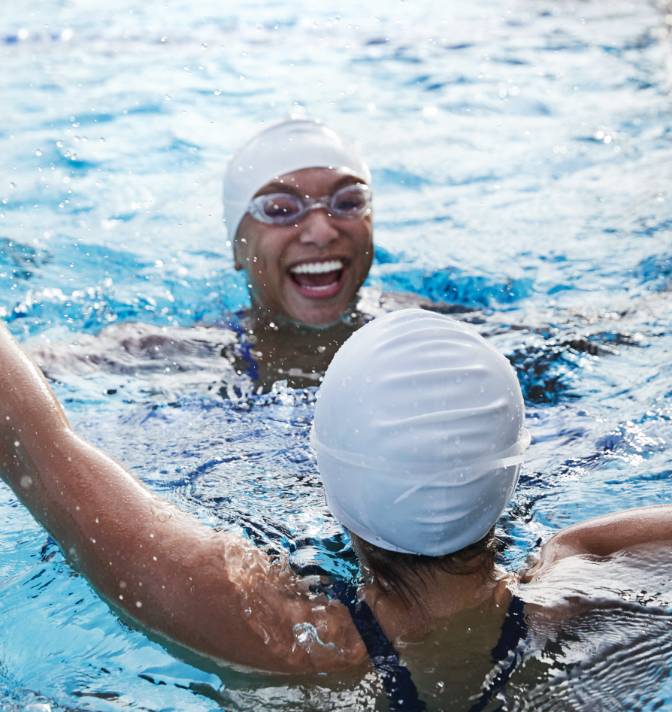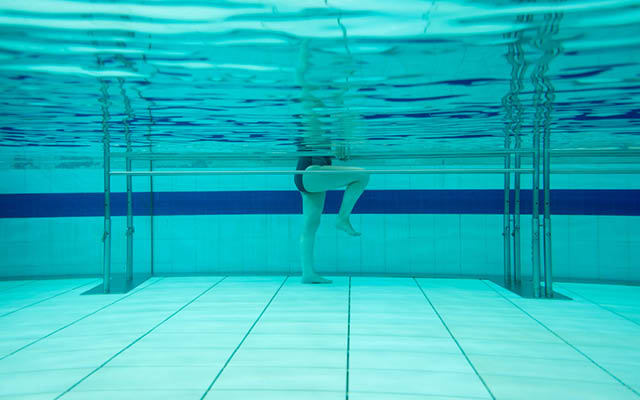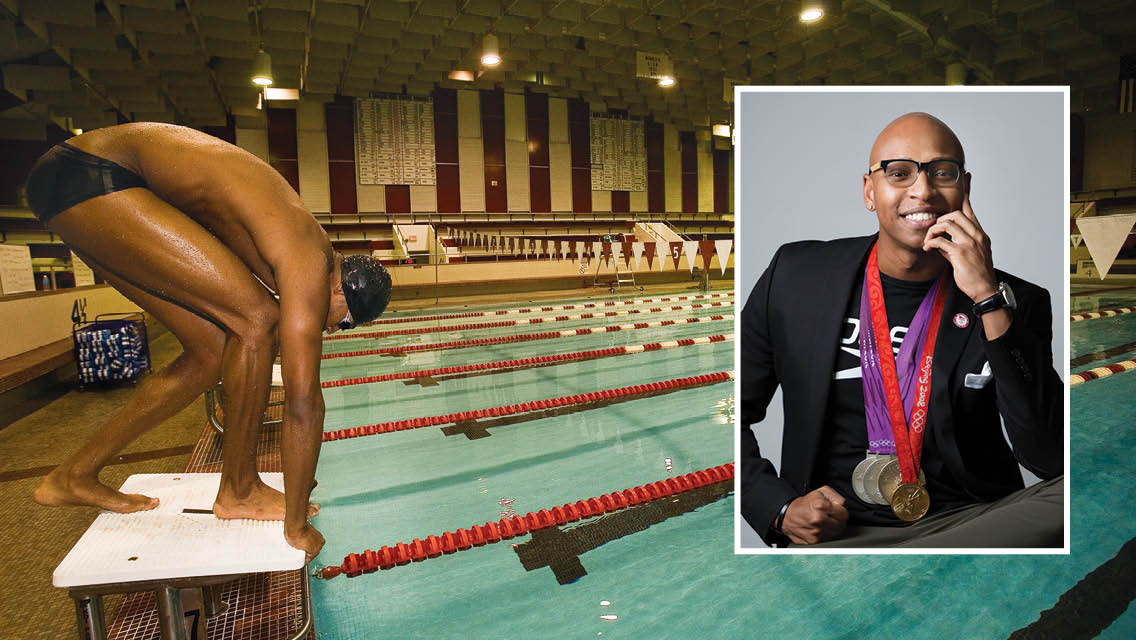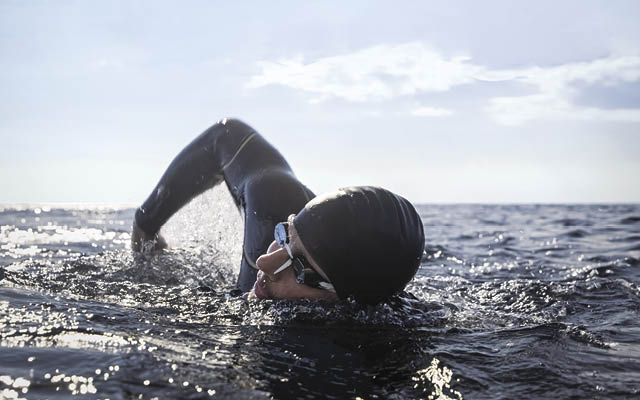When Caeleb Dressel crouches over a starting block at the edge of a pool, the anticipation is palpable. So much of Dressel’s life is spent preparing for the minutes that follow this moment of suspense. For now, the world is quiet, and his body is still. It is in these moments that he gathers his strength.
It’s on full display in mere seconds, when the buzzer goes off and Dressel bursts from the starting block. Swinging his arms backward, then up and over his head — a movement not unlike the butterfly stroke he favors in the water — he launches himself into the air. After a long arc, he slides beneath the surface of the pool.
Dressel is known for this strong start, which mirrors his rapid ascent among the world’s elite swimmers. In his first Olympic appearance at the 2016 Rio Games, the then 19-year-old made waves when he took home two gold medals: one for the 4 x 100-meter freestyle relay and another for the 4 x 100-meter medley relay.
The following year, at the World Aquatics Championships in Budapest, Hungary, he became the second swimmer to win seven gold medals at a World Championship event — a feat first achieved by the legendary Michael Phelps in 2007.
Since then, Dressel has repeatedly been compared with Phelps, the most decorated Olympian of all time. Yet he’s reluctant to put too much stock in the accolade. “I don’t want to say I just brush it off, because I know it’s going to be inevitable,” he told the Associated Press in 2019. “But that’s not why I’m in this sport. . . . It’s not to beat Michael. It’s not to go faster than Michael.”
Indeed, what keeps the Florida native in the water goes much deeper than that. A competitive swimmer since age 5, he showed remarkable talent and commitment from the start. “I think this sport chose me,” he says. “I love the water and have always respected it.”
Thankfully, his passion was not only encouraged but rivaled by his three siblings, all of whom swam competitively as well. Although you might expect that pressure, jealousy, or anxiety arose around their shared pursuit, they managed to put their own ambitions aside and celebrate each other’s successes.
“We all motivate each other and are very supportive of one another,” Caeleb’s younger sister, Sherridon, told Swimming World in 2018. “It’s easy to perform at your best when you’ve got a huge support system like that behind you.”
Up for the Challenge
Considering Dressel’s remarkable talent and supportive family, you might imagine that his road to Olympic glory was smooth.
In reality, there are thousands of grueling practice hours behind his dynamic starts. More sessions in a week than there are days. Innumerable laps in the pool, continually pushing his body to its limit.
“I am in the water nine times a week,” he explains. “I am in the weight room three times a week. I have dryland conditioning two times a week. A typical day is swim 8 to 10, then lift 11 to 12:30, then swim in the afternoon 5 to 7.”
Dressel admits to having moments when he thinks it’s all too much and wants to give up — perhaps more frequently than you’d expect. “Every day,” he confesses. “That’s the fun part.”
“The water has taught me I am capable of more than I even think sometimes. Once you have it made up in your mind, quitting isn’t an option,” he adds. “You become more thankful for these challenges.”
And all that time in the pool and the gym has paid off. After making a splash in Budapest, Dressel wrapped up his collegiate career at the University of Florida in 2018 by setting three individual NCAA records and nabbing his first national relay title. At the conclusion of his stint as a Florida Gator, he had a total of 10 national titles — a memorable legacy.
The following year at the World Championships in Gwangju, South Korea, Dressel won three gold medals in less than three hours and captured eight medals total — six gold and two silver — another achievement rivaled only by Phelps, who was the first swimmer to secure eight medals at a major international meet.
All signs pointed toward a strong performance at the 2020 Tokyo Olympic Games, and Dressel started the year strong, confident, and excited for his second shot at the quadrennial competition. But once the coronavirus pandemic took hold, causing worldwide closures and cancellations, he had to hit the pause button on his dreams.
Looking Inward
When officials announced that the Olympics would be postponed until 2021, Dressel felt the blow. At the Rio Games in 2016, he’d competed in only one individual race in addition to his two gold-medal-winning relay performances. He was hungry for more.
Yet he refused to let disappointment get the best of him, even when so much remained in limbo. Writing a letter to his past self earlier this year, Dressel addressed the difficulty of this time: “Life will be different, but you need to trust in [Gregg] Troy’s coaching plan for you and enjoy the break,” he noted. “And when you do get to come back, it will be the most you’ve ever enjoyed your sport.”
Meanwhile, Dressel took advantage of his time away from competition by focusing inward. “I have learned that there are always areas to improve on in life,” he says. “To get better at swimming does not mean my only chance to improve is in the water. There are so many outlets to capitalize on, and I was thankful for that opportunity this past year.”
The break also allowed him to devote some time to his personal life. He and his fiancée, Meghan Haila, planned their wedding and went house-hunting together. The high school sweethearts married on Feb. 13, 2021, and moved into their new home later that month.
Golden Glory
As soon as restrictions lifted, Dressel was ready. He returned to competition with a renewed vigor: At the Olympic Trials in June, he qualified to swim three individual events in Tokyo. He later signed on for three team relays, as well, bringing his total event count to six.
And when the day finally arrived for Dressel to step up to the Olympic starting block, he did not disappoint. His explosive starts led to triumphant finishes in the 4 x 100-meter freestyle relay, 100-meter freestyle, 100-meter butterfly, 50-meter freestyle, and 4 x 100-meter medley relay.
Yet he’s the first to acknowledge how difficult the experience was. On top of being one of the most recognized faces of the Games and shouldering the weight of the world’s expectations, Dressel was isolated from his friends and family back home, which had its own emotional toll.
He had to rely on his resilient nature, which he describes as “seeing the light at the end of the tunnel and always learning through the valleys and the mountains.”
And what a light there was for him. All told, Dressel claimed five gold medals — a feat that just four other swimmers have accomplished in a single Olympic Games — and crushed his own world record in the 100-meter butterfly.
Most important, he has no regrets. “It’s not the most enjoyable process, but it is worth it,” he told the Associated Press. “Every part of it is worth it.”
This article originally appeared as “Staying Strong and Making Waves” in the October 2021 issue of Experience Life.






This Post Has 0 Comments